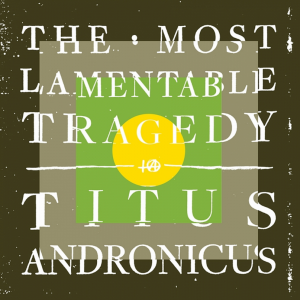25-ish years ago, Nirvana was in the midst of becoming the biggest rock band in the world, influencing their contemporaries and future generations of musicians. At the heart of their short-lived success were the band’s lyrics; plucked from Kurt Cobain’s tortured mind, their strange yet sincere quality resonating with listeners. The tormented genius is a common motif in rock music, and many cases end tragically, but not all of them. Titus Andronicus bandleader Patrick Stickles has found success using his band’s music as a means to work things out in his own tortured mind, in the process creating some of the most interesting and challenging rock music in the past decade. The band’s newest endeavor is a 29-track, 93-minute rock opera called The Most Lamentable Tragedy.
The narrative of TMLT is a little complex; luckily the band has annotated their lyrics on genius.com to help make sense of it. Basically, (and I admit there are still parts I’m fuzzy on) the protagonist, referred to as Our Hero, suffers from manic depression and is in a very dark place in his life, barely interacting with the outside world, until his body is inhabited by a doppelgänger, called The Lookalike, who tries to get Our Hero to take back his life. He (they?) even begin a romance with a woman named Siobhán, but there’s a nagging worry that she will be freaked out by Our Hero’s true self. Eventually The Lookalike relinquishes control, the relationship ends, and Our Hero is left alone again. There is a glimmer of hope though, as the album ends with Our Hero resolving not to take his own life. Part of the narrative apparently takes place a hundred years in the past, possibly in a dream sequence; I honestly can’t quite figure that part out.
The ebb and flow of the story, Our Hero’s mood, the appearance and disappearance of The Lookalike are meant to be a metaphor for the actual cycle of Patrick Stickles’ own manic depression. In an interview with GQ, he describes his reasoning for making the album: “With this rock opera, I was trying to say to myself something that I’ve been terrified to say for a long fucking time. Which is that I’m a manic-depressive and there’s no fucking escape.” Stickles is no stranger to working through personal issues in his music; he’s penned a song about having an eating disorder (“My Eating Dissorder”); he’s written an entire concept album comparing his life to The Civil War (The Monitor), allegedly sparked by a breakup; he’s even got a song about the time he was electrocuted (“(I Am The) Electric Man”). Broken down at the song-level, TMLT includes songs that display Stickles’ dealings with and distrust of certain institutions in America. “I Lost My Mind,” is his own personal indictment against the American healthcare system. His dislike of Christianity and the Catholic Church also pop up throughout the album. This album is by far the greatest and most enlightening look into Stickles’ head.
Musically, Titus Andronicus has a number of different modes, and every single one of them is on display somewhere in the 29 tracks of The Most Lamentable Tragedy. At times Titus Andronicus is a bar band (“Lonely Boy” and “Fatal Flaw”), a punk band (“Look Alive” and “I’m Going Insane”), a folk punk band (“More Perfect Union” and “Come on Siobhán”), a regular folk band (“Stable Boy”), and even Bruce Springsteen on speed (“Dimed Out”). A couple covers show up on the album too, including Daniel Johnston’s “I Had Lost My Mind,” called “I Lost My Mind (DJ)” on TMLT, The Pogues’ “A Pair of Brown Eyes,” “Auld Lang Syne,” and “I’m Going Insane,” a cover of their own song from their previous album, Local Business.
I’ve always been in awe of the musicianship of Titus Andronicus, from their rough and fast Springsteen-inspired punk songs of their first album, The Airing of Grievances, to the sprawling, multi-movement songs off of The Monitor, the band always makes it interesting, impressive, and most importantly, fun to listen to. On TMLT they step up their game even more, recruiting 11 other musicians and vocalists (including Owen Pallett on violin and viola), to help with recording. The result is an album that reaches some impressive highs: “Come On Siobhán” is a fun love song that’s entirely made by the soaring strings, “Fatal Flaw” is a great sounding saloon piano-driven song with a sing along chorus. The real jewel of the album though is “Dimed Out,” named after a term for turning all your on-stage equipment knobs up to 10 to create an intense sound. Even outside of any of that context or the continuity of the album, “Dimed Out” is an inspiring song; I’ve already made the chorus, “I only like it when it’s dimed out,” my personal mantra.
In the beginning of this review I talked about the tragedy that often accompanies tortured genius; interestingly enough the last two genius.com official annotations by Titus Andronicus for this album read “We won’t kill ourselves #REALTALK” and “Promise +@.” So that’s good news; although there are rumblings that this might be the band’s last album. If that is the case, as much as I’d lament the lack of new music and that fact that I only got to see them live once, I’d be okay with TMLT being their stopping point. The album plays like an anthology of all of the musical styles Titus Andronicus has ever dabbled in, Patrick Stickles got to come to terms with a rather large mental health issue that he’s been dealing with, and the band successfully put together this colossal concept. It’s hard to imagine where the band would go from here. The album is called The Most Lamentable Tragedy, a reference to the full name of the Shakespearean play from which the band takes their name, but really it’s a triumph.
The Most Lamentable Tragedy is available now online or at your local record store.



